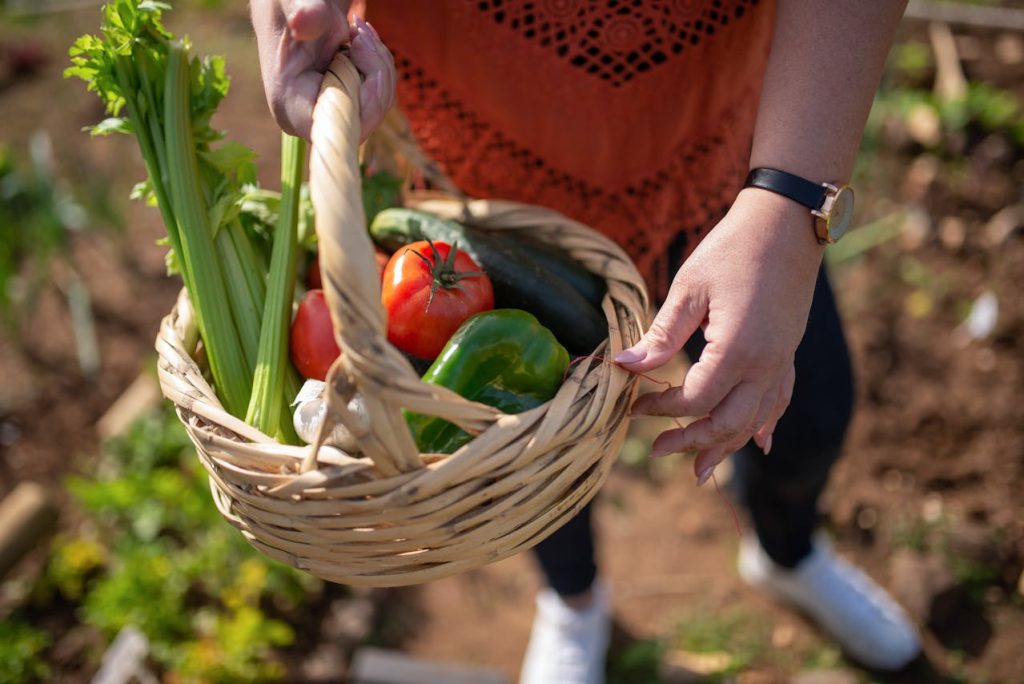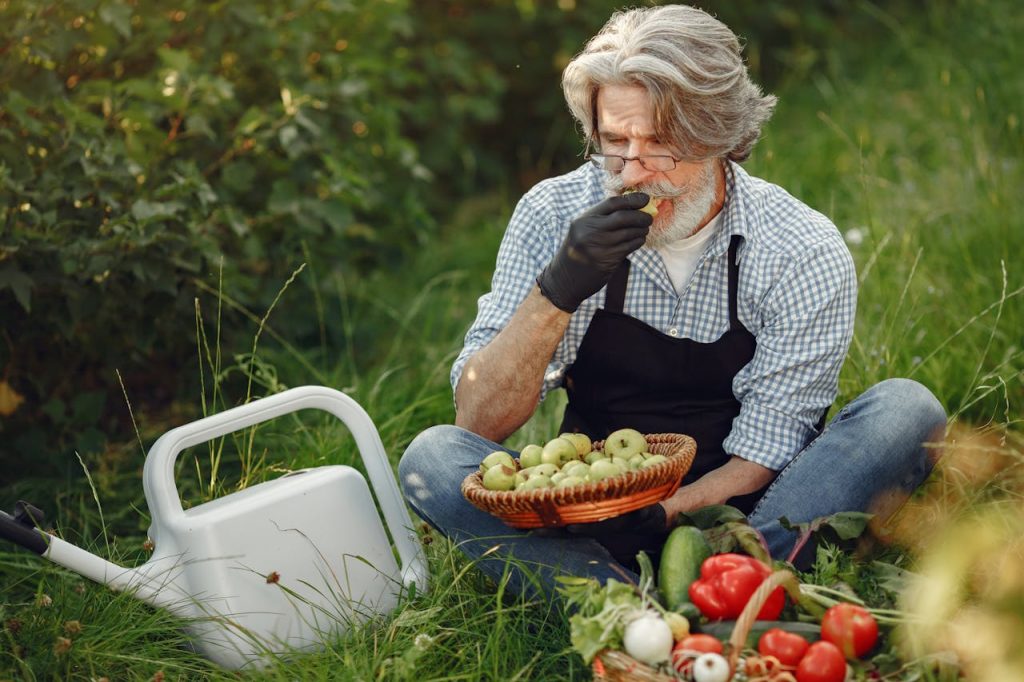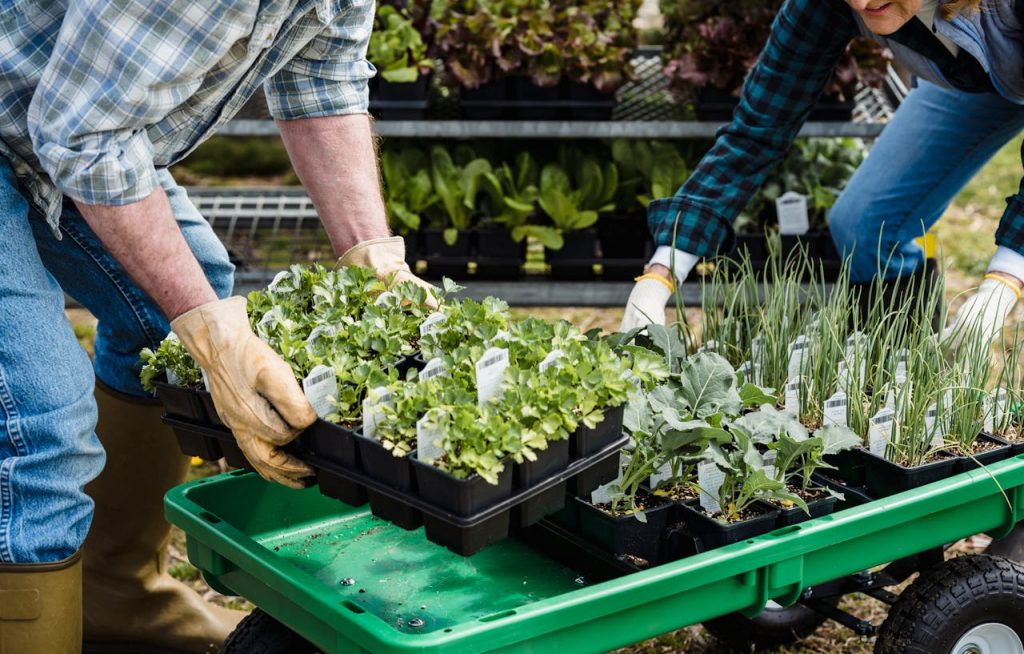Organic Food Benefits: A Guide to Healthier Eating.
Is the food on your plate truly nourishing you and the planet? Let’s look into the benefits of organic food. This question is key. I’ve thought about how my food choices affect my health and the environment.

Organic food is more than a trendy label. It means making food without synthetic pesticides, GMOs, or harmful additives. Eating organic or drinking a tasty and delicious smoothie can boost your health by giving you more nutrients and less harmful chemicals. It also helps the environment by supporting sustainable farming.
Did you know organic animals get better living conditions? This helps them and gives us healthier meat, eggs, and dairy. These products can have up to 50% more nutrients, like omega-3 fatty acids, than non-organic ones.
Choosing organic is not just for our health. It helps the planet too. Organic farming cuts pollution, saves water, makes soil richer, and uses less energy. It’s a way to look after our health and the planet.
Key Takeaways
- Organic food is produced without synthetic pesticides, GMOs, and harmful additives
- Health benefits include higher nutrient content and reduced chemical exposure
- Organic farming promotes environmental sustainability and biodiversity
- Organic meat and dairy contain higher levels of beneficial nutrients
- Choosing organic supports both personal health and ecological balance
Understanding Organic Food: What It Means and Why It Matters
Organic Food Benefits is getting more popular in the UK, but what does it really mean? I’ve looked into organic nutrition to see its importance and how it affects sustainable farming.
Defining Organic Farming Practices
Organic farming uses natural ways and avoids synthetic inputs. It doesn’t use man-made fertilisers, pesticides, or GMOs, says DEFRA. Instead, it uses crop rotation, animal manures, and natural pest control. This helps the soil and supports many different plants and animals, which is good for the planet.
The Role of Certification Bodies in the UK
Certification makes sure products are truly organic. In the UK, eight groups check this. The Soil Association is a top certifier, checking over 70% of organic food. They do yearly checks, sometimes without warning, to make sure everything meets the rules.
Organic vs. Conventional Farming Methods
Organic and conventional farming are very different. Organic farms don’t use weedkillers or much pesticides. They make the soil rich with compost and crop rotations, and don’t use synthetic fertilisers. Animals are treated well, with strict rules for their living conditions and no routine antibiotics.
| Aspect | Organic Farming | Conventional Farming |
|---|---|---|
| Pesticides | Limited use of natural pesticides | Synthetic pesticides allowed |
| Fertilisers | Natural (compost, manure) | Synthetic fertilisers used |
| GMOs | Prohibited | Allowed |
| Animal Welfare | High standards enforced | Varying standards |
Choosing organic food helps sustainable farming and better farming ways. It might be pricier, but it’s good for our health and the planet. It’s a smart choice for our future.
Nutritional Advantages of Organic Produce
Organic fruits and vegetables are getting more popular for their health benefits. They often have more nutrients than non-organic ones.
Organic Food Benefits – Higher Micronutrient Content
Organic farming increases the nutrients in crops. Organic foods can have up to 69% more antioxidants and 52% more vitamin C. This means they can help us meet our daily nutritional needs.
Reduced Exposure to Harmful Chemicals
Organic produce has fewer pesticides and chemicals. Studies show organic crops have four times less pesticide residues. This can be good for our health over time.
Potential Health Benefits of an Organic Diet
| Nutrient | Organic vs Conventional |
|---|---|
| Antioxidants | Up to 69% higher |
| Vitamin C | Up to 52% higher |
| Nitrate levels | 30% lower |
| Cadmium levels | 48% lower |
Organic fruits and vegetables are great, but eating a variety is key for health. Aim for a diet full of different fruits, vegetables, and whole foods.
Environmental Impact of Choosing Organic
Organic farming is great for the environment. It uses methods that keep soil healthy, support many kinds of life, and protect wildlife. By not using synthetic chemicals, it also cuts down on pollution in water and reduces harmful gases in the air.
A study in Frontiers in Nutrition showed that eating more organic fruits and veggies is good for us and the planet. It looked at how organic diets affect the environment, including emissions and land use.
- It supports pollinators and biodiversity, crucial for healthy ecosystems
- Preserves agricultural diversity through crop rotation
- Reduces nitrogen pollution by banning synthetic fertilisers
- Stores more carbon in soil, with organic farms storing around 25% more carbon long-term
Countries like Finland, Austria, and Germany want 20% of their land to be organic. If all of Europe followed organic farming, farming could cut emissions by 40-50% by 2050.
| Farming Method | Energy Use | Greenhouse Gas Emissions | Soil Carbon Storage |
|---|---|---|---|
| Organic | Lower | Reduced | 25% higher |
| Conventional | Higher | Higher | Lower |
Organic farming might produce less food, but it focuses on making soil fertile and keeping ecosystems balanced. By choosing organic, we help a farming way that cares for our planet.
Taste and Freshness: The Organic Difference
When I eat organic fruits and vegetables, I notice a big difference in taste and freshness. Organic food is not just healthier; it also tastes better. Let’s look into why organic produce tastes superior and how eating with the seasons can improve our meals.

Factors Influencing Flavour in Organic Produce
Organic farming makes organic fruits and vegetables taste better. Without synthetic pesticides and fertilisers, plants grow naturally, making them more flavourful. The soil in organic farms also helps improve taste.
| Factor | Impact on Flavour |
|---|---|
| Soil Health | Rich, nutrient-dense soil improves taste |
| Natural Pest Resistance | Increases flavour-enhancing compounds |
| Harvest Timing | Peak ripeness for optimal taste |
Seasonal Eating and Its Impact on Taste
Eating organic produce when it’s in season makes a big difference in flavour. At their peak, organic fruits and vegetables taste their best. Seasonal eating also supports local organic farmers and follows nature’s cycles.
Studies reveal that organic crops have up to 60% more antioxidants than non-organic ones. This means eating organic is like adding 1-2 extra portions of fruit and vegetables daily. It boosts nutrition and flavour. By choosing organic, we help our health and enjoy tastier meals.
Organic Food Benefits: A Comprehensive Overview
Organic farming does more than just help our health. It boosts biodiversity, enriches soil, and cuts down pollution. These efforts make our planet healthier for the next generations.
Organic food is packed with more beneficial compounds than non-organic food. A study by Newcastle University found organic fruits have more polyphenols. These can help protect against cancer.
Choosing organic means eating fewer pesticides. UC Berkeley researchers found organic eaters have lower pesticide levels in their urine. This is especially good news for kids and pregnant women.
| Aspect | Organic Food | Conventional Food |
|---|---|---|
| Pesticide Residue | Lower | Higher |
| Omega-3 Content (in milk and meat) | 50% higher | Lower |
| Antibiotic Use | Banned for prevention | Allowed |
| Animal Welfare Standards | Stricter | Less strict |
Organic food is better for animals too. Farms must follow strict rules to ensure animals live in better conditions. This means healthier animals and possibly more nutritious food for us.
“Organic quality products adhere to strict animal welfare criteria, such as the provision of ample outdoor space, natural behaviours expression, and no beak trimming for chickens.”
Yes, organic food might be pricier. But the benefits for our health and the planet are huge. By picking organic, we’re not just eating better. We’re also supporting a greener food system.
Navigating Organic Labels and Certifications
Exploring the world of organic food shows how vital it is to understand labels and certifications. The organic market is growing fast, drawing in many players. It’s key to spot true organic products when shopping.
Understanding UK Organic Certification Standards
In the UK, organic certification means strict checks and reviews of documents. Farmers must show they follow organic ways, like saving soil and avoiding synthetic stuff. This ensures they meet Organic Codex standards and can sell in premium markets.
Organic certification has many pluses:
- Boosts farmer profits and sustainability
- Builds trust with consumers through labels
- Guarantees products meet strict organic rules
Identifying Genuine Organic Products in Shops
When I shop for organic and non-gmo foods, I check for certified organic labels. These labels show the product has passed strict checks. Some small producers might follow organic ways without a label because it’s too costly.
| Certification Type | Key Features | Consumer Benefits |
|---|---|---|
| USDA Organic | Strict organic standards | Premium quality assurance |
| Non-GMO Project | Traceability of inputs | Assured GMO-free products |
| NSF Gluten-Free | 15 ppm gluten limit | Stricter than FDA standards |
To eat organic with confidence, I always look for these certifications. They not only guarantee quality but also support sustainable farming.
The ‘Dirty Dozen’ and ‘Clean Fifteen’: Prioritising Your Organic Purchases
When I shop for organic fruits and vegetables, I use the ‘Dirty Dozen’ and ‘Clean Fifteen’ lists. These lists tell me which produce to buy organic first. They are updated every year.
The ‘Dirty Dozen’ includes fruits and vegetables with high pesticide levels, even after cleaning or peeling. For 2023/24, the list includes:
- Strawberries
- Spinach
- Kale
- Peaches
- Apples
The ‘Clean Fifteen’ has produce with low pesticide levels. This year’s list has:
- Avocados
- Sweet corn
- Pineapples
- Onions
- Sweet peas
I choose organic for the ‘Dirty Dozen’ to get the most health benefits while saving money. This way, I enjoy the best of organic produce without spending too much.
Organic farming is good for our health and the environment. It cuts down on emissions, reduces pollution, and helps with carbon capture. So, picking organic is great for our health and the planet.
Antibiotic Use in Conventional vs. Organic Farming
Organic and conventional farming differ a lot in antibiotic use. In 2017, antibiotics from farm animals made up about 30% of all antibiotics used in the UK. Organic farming doesn’t use antibiotics. This reduces the risk of antibiotic-resistant bacteria in food, which is a big health concern.
Organic farming also cares more about animal welfare. For example, it doesn’t allow the use of farrowing crates for pigs. These crates stop sows from moving and acting naturally. In the UK, 55% of sows are kept in these crates in non-organic farms.
Balancing Cost and Benefits: Making Organic Food Affordable
Organic food prices can be high, with some items up to 89% more expensive in the UK. You might question if the benefits are worth the cost. Let’s look at how to eat organic without spending too much.
Start by choosing which organic items to buy first. Focus on the ‘dirty dozen’ – fruits and veggies with the most pesticides. These include strawberries, spinach, and apples. For other foods, non-organic can still be healthy and cheaper.
To save money and enjoy organic food benefits, I suggest:
- Shopping at local farmers’ markets
- Growing your own produce
- Buying seasonal items
Remember, organic food’s real value is more than just the price. It helps improve soil health and supports many species. By choosing organic, you’re helping the planet for the future.
By weighing these points, you can decide when to spend on organic and when to choose regular foods. This way, you can enjoy organic eating without breaking the bank.
Growing Your Own Organic Produce: Tips for Home Gardeners
Growing organic fruits and vegetables at home is a rewarding way to support sustainable agriculture. I started with a small plot of about 100 square feet. This size is perfect for beginners and allows for intensive planting.

Essential Techniques for Organic Gardening
To make a thriving organic garden, I follow several key techniques:
- Crop rotation: I plant different crops each season and wait three years before replanting from the same family. This improves yield and soil health.
- Companion planting: I use the ‘3 sisters’ method, combining corn, beans, and squash for mutual benefits.
- Soil mixture: I use 60% topsoil and 40% compost for optimal growing conditions.
- Green manure: Sowing clover during fallow months eliminates the need for artificial fertilisers.
Choosing the Right Crops for Your Space
Selecting the right crops is key for success in organic gardening:
- For quick results, I grow annual vegetables like tomatoes and cucumbers.
- Perennials such as fruits and asparagus require less maintenance once established.
- For children, fast-growing crops like salad, radishes, and peas are perfect.
- I ensure my garden receives full sun for most annual vegetables.
By using these techniques and choosing the right crops, I’ve made a thriving organic garden. It gives me fresh, pesticide-free produce and supports sustainable agriculture.
The Social and Economic Impact of Supporting Organic Agriculture
In the UK, more people are choosing to buy organic food, especially when times are tough. This choice helps local organic farms and builds strong bonds between consumers and farmers. It also boosts the local economy.
Organic farming is good for farmers’ health and wealth. It makes them feel better mentally and financially. It uses fewer chemicals, saving money and increasing profits. This leads to happier families and stronger communities.
Organic farming also benefits people beyond the farm. Eating organic food can lower the risk of health problems like allergies and obesity. This means healthier communities and could cut down on healthcare costs.
| Aspect | Impact of Organic Farming |
|---|---|
| Economic | Lower input costs, higher earnings, reduced financial risks |
| Social | Improved farmer well-being, stronger community relationships |
| Environmental | Better resource management, reduced chemical use |
| Health | Decreased rates of various health issues in consumers |
Supporting organic farming helps meet the UN’s goals for 2030, like ending hunger and malnutrition. By choosing organic, we’re not just eating healthier. We’re also helping create a fairer and greener future for everyone.
Conclusion:
Embracing Organic Food Benefits for a Healthier Future
Thinking about organic food makes me see its big impact. The Organic Trade Association says organic food has more antioxidants. These are good for fighting chronic diseases.
Organic Food Benefits is not just good for us. It’s also good for the planet. Organic farming helps the soil, saves water, and cuts down on harmful gases. It also helps many different plants and animals to thrive.
Choosing organic is about more than just eating well. It helps small farmers and boosts local economies. It also means fairer work conditions. By picking organic, we help ourselves and the earth for the future.
FAQ
What is organic food?
Organic food is made without synthetic pesticides, GMOs, or antibiotics. It also doesn’t have growth hormones, artificial colours, or preservatives. This type of food uses farming methods that are good for the environment and nature.
What are the health benefits of organic food?
Organic food might have more vitamins, minerals, and antioxidants. It has fewer pesticide residues and less antibiotic-resistant bacteria. Some studies show it can help with allergies, obesity, and skin health.
How does organic farming differ from conventional methods?
Organic farming doesn’t use synthetic pesticides or fertilisers. It cares for animal welfare and supports many different plants and animals. It uses natural ways to control pests and focuses on keeping the soil healthy.
What is the role of organic certification bodies in the UK?
In the UK, eight groups check if food is organic. They make sure products meet strict organic rules through inspections and certifications.
Does organic food taste better than conventional produce?
Yes, organic produce is often picked when it’s at its best, so it tastes better. Eating food that’s in season and from local organic farms can make it even tastier. It also doesn’t have artificial additives, which can make the real taste stand out.
How can I identify genuine organic products in shops?
Look for official organic labels and seals when shopping. It’s important to know the difference between ‘organic’, ‘100% organic’, and ‘made with organic ingredients’. Some small producers might follow organic ways but not get certified because it costs too much.
What are the ‘Dirty Dozen’ and ‘Clean Fifteen’?
The ‘Dirty Dozen’ are fruits and vegetables with the most pesticide residues if grown the usual way. The ‘Clean Fifteen’ have less pesticide residue. This info helps you decide which organic produce to buy first.
How can I make organic food more affordable?
To make organic food cheaper, focus on buying organic ‘Dirty Dozen’ items. Shop at farmers’ markets, grow your own food, and buy what’s in season. Remember, the long-term health and environmental benefits are worth the cost.
What are some essential techniques for organic gardening at home?
Key organic gardening tips include composting, controlling pests naturally, and rotating crops. Start with easy plants like herbs and some vegetables that fit your space, whether it’s a garden, balcony, or windowsill.
What are the social and economic impacts of supporting organic agriculture?
Supporting organic farming helps farmers get fair pay and better working conditions. It boosts local economies, cuts down on food transport, helps rural areas, and keeps traditional farming alive.
Source Links
- https://www.mayoclinic.org/healthy-lifestyle/nutrition-and-healthy-eating/in-depth/organic-food/art-20043880
- https://www.helpguide.org/wellness/nutrition/organic-foods
- https://www.nimbarkfoods.com/blog-43-top-10-benefits-of-eating-organic-foods-a-comprehensive-guide-for-health-conscious-consumers
- https://www.bbcgoodfood.com/howto/guide/organic
- https://www.soilassociation.org/take-action/organic-living/what-is-organic/
- https://www.usda.gov/media/blog/2012/03/22/organic-101-what-usda-organic-label-means
- https://www.ncbi.nlm.nih.gov/pmc/articles/PMC7019963/
- https://www.healthline.com/nutrition/what-is-organic-food
- https://www.bbcgoodfood.com/health/nutrition/is-organic-healthier
- https://news.climate.columbia.edu/2019/10/22/organic-food-better-environment/
- https://www.foragerproject.com/blog/choosing-organic-better-for-you-and-the-planet/
- https://www.soilassociation.org/take-action/organic-living/why-organic/better-for-the-planet/
- https://www.unlockfood.ca/en/Articles/Farming-Food-production/Organic-Foods-and-Growing-Methods-FAQ.aspx
- https://www.theguardian.com/environment/2014/jul/11/organic-food-more-antioxidants-study
- https://www.gardenorganic.org.uk/our-views/is-organic-food-better-for-you
- https://www.ncbi.nlm.nih.gov/pmc/articles/PMC10814746/
- https://www.breastcanceruk.org.uk/what-are-the-benefits-of-organic-food/
- https://www.linkedin.com/pulse/navigating-organic-integrity-certification-ensuring-mathew-varghese-ems1c
- https://www.nsf.org/knowledge-library/benefits-organic-non-gmo-gluten-free-labels
- https://www.plenishdrinks.com/why-you-should-choose-organic-the-dirty-dozen-the-clean-fifteen/
- https://www.rosielettsnutrition.com/resources/dirty-dozen-clean-15/
- https://www.soilassociation.org/take-action/organic-living/why-organic/better-for-animals/
- https://www.ncbi.nlm.nih.gov/pmc/articles/PMC5658984/
- https://www.bbcgoodfood.com/howto/guide/is-organic-healthier
- https://milnepublishing.geneseo.edu/good-corporation-bad-corporation/chapter/7-organic-food-health-benefit-or-marketing-ploy/
- https://www.smilinggardener.com/organic-vegetable-gardening/grow-organic-food/
- https://hub.suttons.co.uk/gardening-advice/how-to-grow-organic-vegetables-from-seed
- https://theobserver-qiaa.org/the-socio-economic-benefits-of-organic-farming-an-interview-with-glorious-organics-susan-davidson
- https://www.ncbi.nlm.nih.gov/pmc/articles/PMC10069358/
- https://www.organicvoices.org/celebrating-organic-month-embrace-organic-for-a-healthier-planet/
- https://www.linkedin.com/pulse/10-compelling-reasons-embrace-organic-food-earthen-connect



